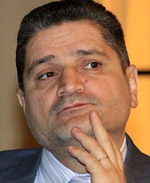A real politician is the one who can foresee what is going to happen tomorrow and then explain why it happened. When we look at the high rank officials we judge their failures based on these words Winston Churchill said.
It is a pity that many of the officials cannot be considered good politicians according to this formula as they failed for many times to explain or justify their predictions or ideas. In contrast, prime minister Tigran Sargsyan uses the classic model and explains why his forecast did not come true and why the economic slump exceeded the limit of 18 per cent. “The first issue people worry about is the question why the government fails to make correct predictions about the economic situation in 2009 and accordingly in 2010 as well. One of the characteristics of the crisis is the fact that the harmony falls. The modern economy does not have tools and opportunities to evaluate how deep the crisis will be, when it will finish and how long it will continue, and when it may start recovering. This is one of the main characteristics of the crisis and shows what the crisis is,” said the prime minister to the representatives of the nation in the parliament on October 30.
It is hard to disagree with these words. In fact no one wants to blame the prime minister and ask why the expected 9 per cent of growth did not come true and instead of it the growth amounted 7 per cent, later it became zero, and then the economic slump reached 5%, and 9%. Everyone may make a mistake. In this case together with the prime minister the World Bank, IMF and a number of other international organizations were mistaken as well. The destiny was very cruel to the government this time. “The world financial and economic crisis is a specific self-regulatory mechanism, including through closing the huge gap between developed and developing countries. It creates difficulties but meanwhile gives opportunities to developing countries and discovers their competition privileges,” said the prime minister during the 2009 budget presentation one year ago.
What did happen later? The gap deepened. The gap became bigger not only between Armenia and the developed countries, but the developing countries as well because Armenia had the highest economic slump among the CIS countries. Instead of revealing the competition privileges the crisis revealed the failures of our government, or as the prime minister says “the vulnerable sides of our economy” such as low level of diversification, domination of oligarchic system and low competition, weak motivation in the system of the government, etc. (before the crisis everyone knew about it besides the authorities). “Thousands of our compatriots overseas suffered from the crisis are looking for an opportunity of investments and saving. We must create opportunities for them and direct them to invest their allocations in the banking system of Armenia. Currently our banking system is a peaceful port for savings. It complies with our ambitions to become a financial center,” said Tigran Sargsyan in his speech one year ago. But his expectations to attract the savings of our compatriots did not come true. He also said that the government would invest the resources in revealing additional stimulus and development. As we see now, it did not happen. As for global projects, he said that the economy would also develop due to the construction of a new atomic station and Iran-Armenia railway, a pan-Armenian bank and foundation. The pan-Armenian bank does not show any signs of activation, the mortgage interest rates have fallen by 1-2 per cent, but it has nothing to do with economic growth. Concerning the Iran-Armenia railway he said that concrete steps were being done and during the president’s visit to Iran an agreement was signed and the parties reached a political agreement on that. In fact the words are still on the paper. Concerning the new atomic station he said that they had already selected an ad hoc and the company in charge of developing the construction strategy and plan was the Warley Parsons. They have already spent $400.000 for organizing the construction and the parliament has adopted a corresponding law as well.
Only the government’s high rank officials may know whether the agreement on building the railway and the money spent on organizing the construction of a new atomic station have helped our economy.
In a word, the government failed to make correct predictions and do concrete work as well.
On the other hand, the positive thing is that the government is more careful now and when making predictions they are trying to be modest. “The information that is used for the budget of 2010 is based on the predictions of the International Monetary Fund, World Bank, Russia which are available at present, and we should follow these predictions as they may be amended. It means that we should be fast and work in an operative manner,” said the prime minister in the parliament on Friday.
In fact the government informs beforehand that the predictions may not come true (including the growth of 1.2% in 2010). In fact the biggest lesson from the crisis was that the government should not be self-confident too much, at least when speaking… On the other hand, they may keep from making any predictions generally.

